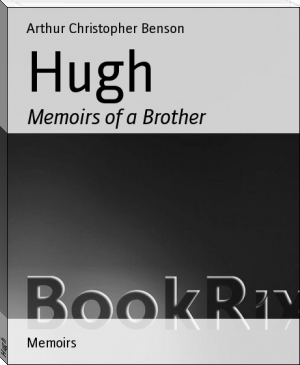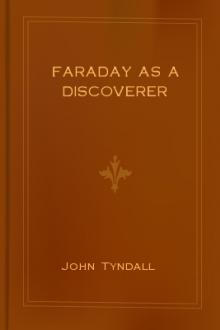Memoirs of Arthur Hamilton, B. A. Of Trinity College, Cambridge, Arthur Christopher Benson [the little red hen ebook txt] 📗

- Author: Arthur Christopher Benson
Book online «Memoirs of Arthur Hamilton, B. A. Of Trinity College, Cambridge, Arthur Christopher Benson [the little red hen ebook txt] 📗». Author Arthur Christopher Benson
I find this conversation narrated in his diary, almost word for word as I have given it. But there is omitted from it, necessarily perhaps, the most pregnant comment of all.
"And yet," he said to me once, as he turned to leave the room after commenting upon their freedom of speech with one another, "I am not in love with her, though I can't think why I am not."
The sequel must be soon told. Miss B—— suddenly accepted a gentleman who was in every way a suitable _parti_: heir to a peerage, of fairly high character.
But to return to Arthur. I can not do better than quote a few sentences of a letter he wrote to me on the event. It conceals—as he was wont to do—strong feeling under the bantering tone.
"As you are in possession of most of my moral and mental diagnoses, I had better communicate to you a new and disturbing element. You remember what I said to you about Miss B——, that I did not care for her. A fancied immunity is often a premonitory symptom of disease: the system is excited into an instantaneous glow by the first contact of the poisonous seed.
"I don't know, at present, quite how things are with me. I labour under a great oppression of spirit. I have a strange thirsty longing to see her face and hear her speech. If I could only hear from herself that she had done what her best self—of which we have often spoken—ratifies, I should feel more content. But she trusts her impulses too much; and the habit of loving all she loves with passion, blinds her a little. A woman who loves her sister, her pets, the very sunshine and air with passion, hardly knows what a lover is. I can not help feeling that I might have shown her a little better than J——. Still one must accept facts and interpret them, especially in cases where one has not even been allowed to try and fail; for I never spoke to her a word of love. Ah, well! perhaps I shall be stronger soon."
CHAPTER VIII
Arthur Hamilton as an author
I must give a chapter to this subject, because it entered very largely into Arthur's life, although he was singularly unsuccessful as an author, considering the high level of his mental powers.
He lacked somehow, not exactly the gift of expression—his letters testify to that—but the gift of proportion and combination.
His essays are disjointed—discursive and eloquent in parts, and bare and meagre in others. Connections are omitted, passages of real and rare beauty jostling with long passages of the most common-place rhetoric. His platitudes, however, to myself who knew him, have a genuine ring about them; he never admitted a truism into his writing till it had become his own by vivid realization. As he himself says:
"I always find a peculiar interest in the solemn enunciation of a platitude by a dull person who does not naturally aim at effect. You feel sure it is the condensation of life and experience. Such an utterance often brings a platitude home to me as no amount of rhetorical writing can."
Still, the reading public will not stand this, and Arthur never found a market.
He wrote voluminously.
I have in my bureau several pigeon-holes crammed with manuscripts in his curious sprawling hand. He wrote, when he was in the mood, very quickly, with hardly an erasure. Among them is:
1. A collection of poems (128 in all).
2. A complete novel, called "The Unencumbered Man."
3. Three incomplete novels, called "Physiognomy," "Helena," "From Hall to Hall."
4. Essays on historical and literary subjects, such as "Coleridge," "Bunyan," "The Earl of Surrey," "Lucian," etc. These, as far as I can make out, are very poor.
5. A collection of semi-mystical writings and short stories. There is a great fertility of imagination about these, and they are composed in a very finished style. It is not improbable that I shall re-edit these, as they seem to me to be distinctly first-rate work. I give a short specimen of his mystical writing—a style of which he was very fond. It is called:
"The Great Assize.
"Now, it came to pass that on a certain day the Gods were weary. Odin sat upon his throne, and rested his chin upon his hand. And Thor came in, and threw his hammer upon the earth, and said, 'I am weary of walking up and down in the earth, of smiting and slaying; and I know not how to bind or heal up, and I am too old to learn.' And Freya said, 'I am weary of Valhalla and the birds and trees, the perpetual sunshine and the feasts and laughter.' So also said all the Gods.
"And Odin, when the clamour was stilled, rose from his throne, and spoke. He told them of an ancient law of the Gods, so ancient that it seemed dim even to himself, that when the Gods should be heavy and be sad at heart, they should appoint a judgment for men, should open the everlasting records, and call the world to the assize; and Loki should be the accuser, and Night and Day the witnesses, and Odin should deliver sentence, with the Gods for assessors.
"So Thor stepped out upon the bar of heaven, and blew the steel trumpet that is chained to the door-post of the hall.
"Shrill and angry came the sound of the great horn over earth, her woods and valleys; and terrible was the sound of wailing and lamentation. They prayed to the mountains to fall upon them, and the sea to swallow them up; for they said, 'The secrets of the heart must now be spoken. The Lord and our brethren will hear them. And who can bear the shame? Oh, that we had not turned away!'
"But the winds of the earth, and the voices of the morning, and the waves of the moaning sea drove them shrieking into the judgment hall, and Loki began his accusation.
"And so foul a tale it was, that the men and women folk prayed and cried no longer, but sank down in dull silence for fear. And the stars that listened overhead shrank out of the sky, and the sea stilled his waves to hear, and the very Gods turned pale and red where they sat, to think that vileness and oppression had thriven so upon the earth, and that deeds of shame had fallen so thick, and that they had in no wise hindered it, but rather increased the sum of sin.
"At last the words of Loki were over, and left a burning silence in the hall; and the sun and moon bowed their heads in witness, and Night and Day said 'Yea,' and 'Truth, he has told truth.'
"Then there was a silence, and all looked at Odin as he sat, sunk down and silent, in his chair, staring at the shrinking crowd with eyes of shame, and majesty, and anger.
"And at the last he rose, and he was clad in grey mists from head to foot, with a cloud of gleaming gold upon his head, like the sunlight on white cliffs seen over the sea through the haze of a summer morning.
"But ere he opened his lips to speak, one who sat among the folk arose and came up the hall, walking strongly and briskly like a king, and looking about him with a resolute and cheerful face to left and right.
"And all held their breath to see him pass, wondering what this thing might be.
"But the man, when he had reached the middle of the hall, cried with a loud voice, 'Hold.'
"And Odin's face gleamed white with rage through the fringes of the mist, and he said between his teeth, 'Who art thou?'
"And at his voice Freya started and blanched, and wrapped herself in her robe.
"And the man said, in a clear loud voice, not defiant, but with a certain royalty about it—
"'Lord Odin, I am he of whom thou spokest but now; he of whom the ancient oracles have spoken, whom thou knowest, and yet knowest not.'
"And Odin said, 'I know thee not; stand aside therefore, that I may judge thee and thy fellows.'
"And there was a hideous silence for a moment while you might count a score, and the twain stared upon each other.
"Then the man said, in the same voice that shook not nor quivered, 'When the Gods shall sit in order to judge the earth, then shall one come out of the midst of created things, through the earth, and walking upon it; and at his coming the pillars of Valhalla shall be snapped, and the everlasting halls shall fall.' And he added other words, which the Gods knew, but not the men or women folk. And when he ceased speaking there blew as it were a whirlwind out of Valhalla, and the high Gods passed away, as it were in skeins and fringes of hanging mist. Then there were lightnings and thunders, and the earth shook; and terrible voices were heard in heaven, passing to and fro. And one said, 'Hence, ye that corrupt justice;' and another said, 'The brood of the eagle is come home to roost;' and another, 'The roof is down.' And then there were yells and groans; and among mankind there was weeping and laughter, many smiles and tears, and they cried to the stranger, 'Judge us, thou king of Gods and men.' But he, turning, said, 'Nay, but ye are judged already.' Then was there peace on earth."
There are, besides these, several unfinished studies, and two or three note-books full of jotted conversations and thoughts of all kinds—a curious mixture.
He carefully left all the publishers' letters which he received in answer to his application. They are twenty-two in number, and are all refusals. They are tied carefully up, and are labeled, "My Literary Career."
All these compositions are the work of about seven years, except some of the poems which were written at Cambridge. The novel was begun and finished in about six weeks, in 1878. It is a poor plot, and mawkish in character, though not without merits of style.
During all this time his interest in writing never flagged. He felt that he had one or two ideas, on which he had a firm grasp, to communicate to the world, and he worked at them incessantly in new and ever-varying forms.
The issue would seem to show that he was not destined to communicate them directly to others—at least, in his own lifetime; and, indeed, no one was quicker at interpreting events than himself. He gave the enterprise a long and severe trial, but the resolute front with which he was met, showed him clearly that it was not to be. It may be that the record of his life, little as he ever imagined it would come before the world, may effect a part of what he himself prepared to do.
Occasionally, for he was of quick sensibilities, throughout this period he felt the bitterness of constant rebuff. The following letter he wrote me shows it:
"I am beginning to feel as if publishers had a code of signals or private marks like freemasonry, which they scribble sometimes, like the concealed marks on bank-notes, on





Comments (0)